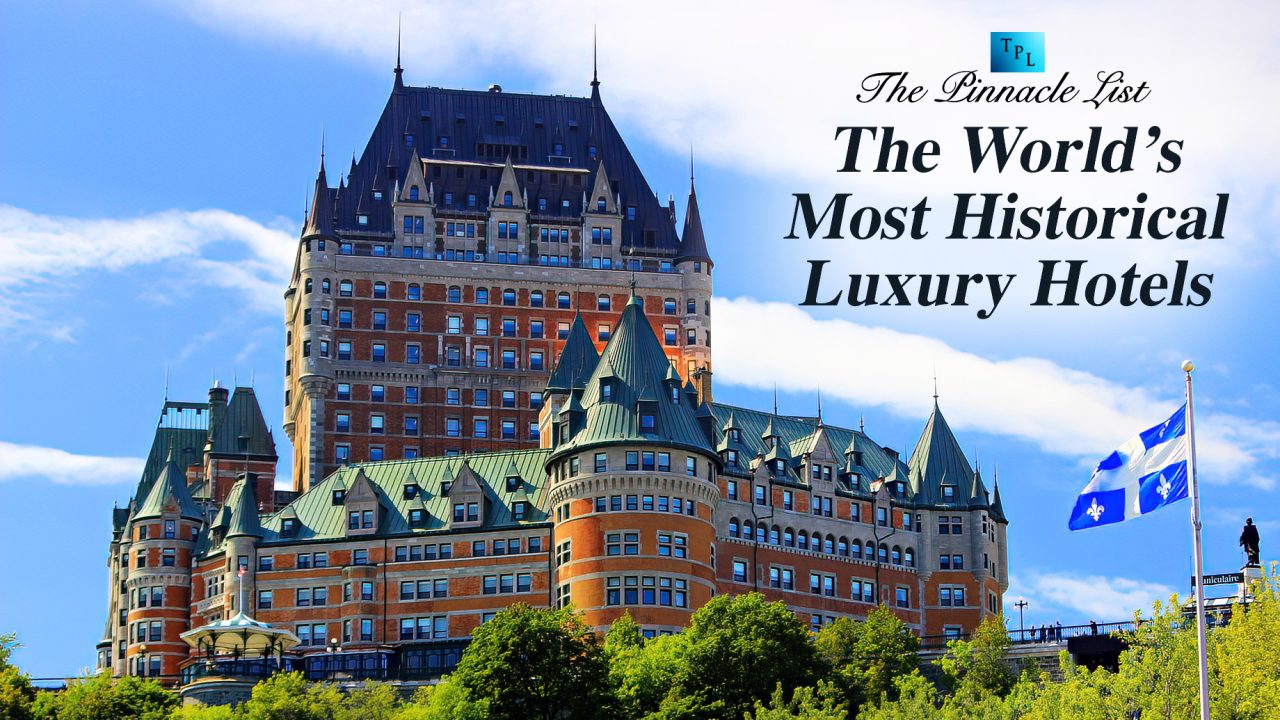Unique Luxury Hotels With Rich Historical Background To Explore
Unique luxury hotels with rich historical background to explore immerse travelers in a blend of opulence and history. These remarkable establishments offer more than just lavish accommodations; they tell captivating stories of the past through their architecture, decor, and the very essence of their existence. Discovering the layers of history embedded in these hotels enhances the travel experience, inviting guests to connect with the cultural heritage and significant events that have unfolded within their walls.
From iconic architectural styles that define their character to pivotal moments that shaped their legacy, these hotels serve as living museums where guests can enjoy the luxury of modern amenities while appreciating the rich tapestry of history that surrounds them. Each stay becomes a journey through time, revealing the unique tales and historical significance that make these luxury hotels truly exceptional.
Unique Characteristics of Luxury Hotels
Luxury hotels often stand out not only for their opulence but also for their fascinating historical backgrounds that manifest through unique architectural styles and design choices. These properties serve as living museums, where guests can experience the grandeur of eras gone by while enjoying modern amenities. The distinctive characteristics of luxury hotels encompass a rich tapestry of aesthetics, historical significance, and intricate design elements that reflect their heritage.
Architectural styles play a crucial role in defining the character and allure of luxury hotels. They often represent a blend of various cultural influences and historical periods, contributing to the uniqueness of each property. Luxury hotels are typically characterized by their grand facades, intricate details, and the use of high-quality materials that highlight craftsmanship.
Architectural Styles Defining Unique Luxury Hotels
The architectural styles of luxury hotels vary significantly, drawing inspiration from historical movements and local traditions. Notable styles include:
- Neoclassical: This style is marked by grand columns, symmetrical shapes, and an elegant aesthetic that evokes the grandeur of ancient Greek and Roman architecture. Examples include The Ritz Paris, which features a stunning façade and opulent interiors.
- Art Deco: Known for its bold geometric shapes and vibrant colors, this style reflects the exuberance of the 1920s and 1930s. The Delano South Beach in Miami showcases this with its striking lines and luxurious finishes.
- Victorian: Characterized by intricate embellishments and ornate detailing, Victorian-style hotels, such as The Fairmont San Francisco, offer a glimpse into the elegance of the 19th century.
- Modernist: This style prioritizes simplicity and functionality, often featuring open spaces and clean lines. The Viceroy in Palm Springs exemplifies modernist principles while maintaining luxury.
Elements Contributing to Historic Significance
Luxury hotels often carry rich histories that enhance their allure. Several elements contribute to their historic significance:
- Location: Many luxury hotels are situated in historically important areas, contributing to their narrative. For instance, the Savoy in London is not only a luxury hotel but also a landmark of British hospitality and entertainment.
- Renowned Guests: The history of hotels is often intertwined with famous personalities. Luxury hotels like The Beverly Hills Hotel have hosted countless celebrities, adding to their storied past.
- Restoration and Preservation: Maintaining historical features while updating facilities is crucial. Properties like the Hotel Colonnade in Miami exemplify this balance, preserving original architecture while providing modern comfort.
Design and Décor Showcasing Heritage
The design and décor of luxury hotels play a pivotal role in showcasing their heritage. Thoughtful interior design not only enhances the aesthetic appeal but also pays homage to the hotel’s history. Unique décor elements often include:
- Antique Furnishings: Carefully curated antique pieces can evoke the hotel’s past, allowing guests to experience the elegance of a bygone era. The Waldorf Astoria in New York is known for its timeless elegance with vintage furnishings.
- Local Art and Craftsmanship: Incorporating local artistry and craftsmanship into the décor enhances the hotel’s connection to its surroundings. The Amangiri in Utah features artworks inspired by Native American heritage.
- Thematic Design Elements: Many hotels embrace thematic designs that reflect their history or locale, such as the Venetian Resort in Las Vegas, which draws inspiration from the architecture and ambiance of Venice, Italy.
“Luxury hotels are not just places to stay; they are gateways to the past, where architecture, history, and design converge to create unforgettable experiences.”
Historical Background of Luxury Hotels
The history of luxury hotels is as rich and varied as the guests they serve. From their origins in ancient times to the opulent establishments of today, these hotels have been shaped by pivotal moments in history. They not only offer comfort and service but also tell a story of grandeur, culture, and the evolution of hospitality. The fascinating narratives behind their founding often reflect the socio-economic conditions and cultural movements of their times.
Throughout the centuries, several landmark events have influenced the development of luxury hotels, marking significant turning points. Initially, inns and lodges catered to travelers, but with the rise of industrialization and increased mobility, the demand for lavish accommodations grew. This led to the establishment of iconic hotels that have become synonymous with luxury and historical significance.
Pivotal Moments in Luxury Hotel History
A few key developments stand out in the history of luxury hotels, highlighting their evolution and the broader cultural shifts of their eras.
- The Birth of the Modern Hotel: The opening of the Hôtel de Paris in Monte Carlo in 1864 set a new standard in luxury, introducing amenities like telephones and private bathrooms, which redefined guest expectations.
- World War II and the Boom: Following the war, a surge in tourism and international travel in the mid-20th century led to the rise of large hotel chains, such as Hilton and Marriott, making luxury more accessible worldwide.
- Preservation and Restoration Movements: In the late 20th century, several historic hotels underwent renovations that preserved their architectural integrity while modernizing facilities, such as The Ritz London, which reopened in 1998 after extensive restoration.
Founding Stories of Iconic Hotels, Unique luxury hotels with rich historical background to explore
The origins of several renowned luxury hotels tell captivating tales that often reflect their environment and the vision of their founders.
- The Savoy, London: Founded in 1889 by Richard D’Oyly Carte, the Savoy was the first hotel in Britain to have electric lights and an elevator, catering to the elite with unparalleled service.
- The Waldorf Astoria, New York: Originally built in 1893, its founding was a collaborative effort of the Astor family, whose vision was to create a luxurious home away from home for the wealthy elite visiting New York.
- Hotel Negresco, Nice: Opened in 1912, Henri Negresco designed this iconic hotel to be a symbol of luxury on the French Riviera, showcasing art from the Renaissance to contemporary pieces integrated within its decor.
Renovations Preserving Historical Essence
Major renovations of luxury hotels often aim to enhance guest experiences while maintaining the historical character that defines them.
- The Fairmont Empress, Victoria: This hotel has undergone extensive renovations to modernize guest amenities while carefully restoring its Edwardian architectural style and historic interiors.
- Hotel de Crillon, Paris: After a three-year renovation, this historic hotel reopened in 2017, balancing modern luxury with its 18th-century heritage, including meticulously restored chandeliers and period furnishings.
- The Pierre, New York: Underwent a significant refurbishment in 2009, preserving its landmark status while incorporating contemporary luxury, ensuring it remains a classic yet relevant destination for travelers.
Noteworthy Luxury Hotels with Rich History
Luxury hotels often serve as living museums, housing stories of notable guests, significant events, and rich cultural heritage. These establishments not only provide opulent accommodations but also offer a glimpse into the past, where history and elegance intertwine. The allure of staying in a hotel with a fascinating historical background adds an extra layer of charm to the travel experience, making it memorable and unique.
Among the myriad of luxury hotels worldwide, a select few stand out due to their remarkable historical significance and the tales that accompany them. Below are some noteworthy luxury hotels renowned for their rich histories, complete with the unique stories and historical events that unfolded within their walls.
Notable Luxury Hotels with Historical Significance
The following hotels are celebrated not just for their luxurious accommodations but also for their intriguing pasts that have shaped their identities:
- The Ritz Paris, France: This iconic hotel opened in 1898 and quickly became a symbol of luxury and glamour. It has hosted royalty, dignitaries, and celebrities, including Coco Chanel and Ernest Hemingway. The Ritz was also a favorite hideaway for spies during World War II, making it a significant location during a turbulent time in history. The hotel has undergone extensive renovations yet retains its historical charm, featuring the same lavish decor that has attracted elite guests for over a century.
- Hotel del Coronado, California, USA: Opened in 1888, this beachfront hotel is famous for its Victorian architecture and has been a witness to numerous historical events. It was here that the film “Some Like It Hot” was filmed, starring Marilyn Monroe. Moreover, the hotel is said to be haunted, adding a layer of intrigue to its history. The Hotel del Coronado has been a designated National Historic Landmark since 1977.
- Claridge’s, London, England: This luxury hotel has been serving guests since 1856 and is known for its Art Deco style. Claridge’s has hosted many prominent figures, including Queen Elizabeth II and Winston Churchill. During World War II, the hotel served as a refuge for British soldiers and a meeting point for the Allied forces, making it a significant location in wartime history.
- The Savoy, London, England: Established in 1889, The Savoy is one of London’s most distinguished hotels, recognized for its theatrical heritage. The hotel has welcomed several famous personalities, including Oscar Wilde and Frank Sinatra. The Savoy was also noteworthy for being the first hotel in Britain to have electric lights and an elevator, showcasing its innovative spirit during its early years.
- Palace Hotel, San Francisco, USA: Opened in 1875, this hotel is known for its grand architecture and opulent interiors. The Palace Hotel has hosted numerous U.S. presidents and important dignitaries throughout its history. Following the 1906 earthquake, it was completely rebuilt, reflecting the resilience of its legacy. The Palace Hotel’s famous Garden Court, adorned with a stained-glass dome, remains a stunning example of its historical architecture.
Cultural Impact of Historic Luxury Hotels
The influence of historic luxury hotels extends beyond their opulent interiors and exquisite services; these establishments often serve as cultural touchstones in their communities. By offering a unique blend of luxury and history, these hotels not only attract affluent travelers but also enrich the local culture and tourism landscape. Their presence can shape the identity of a destination, perpetuating traditions while also fostering a sense of heritage and pride among local residents.
Historic luxury hotels have played a pivotal role in influencing local culture and tourism. Many of these establishments are not just places to stay; they are architectural marvels that reflect the aesthetic and historical nuances of their regions. The grandeur of their design often tells stories of a bygone era, offering visitors a glimpse into history while creating economic opportunities for the surrounding community. As cultural hubs, these hotels host events, art exhibitions, and culinary experiences that celebrate local traditions, thus encouraging a vibrant interchange between guests and residents.
Comparison of Experiences: Historic Hotels vs. Modern Luxury Accommodations
When comparing the experiences offered by historic luxury hotels to those of modern luxury accommodations, significant differences in ambiance, personalization, and cultural engagement emerge.
Historic hotels often boast unique architectural styles and decor that provide guests with an immersive experience rooted in the locale’s history. Guests may find themselves walking through grand ballrooms adorned with antique furnishings, or relaxing in lush gardens that have been meticulously preserved. This allows for a profound connection to the past that modern hotels, typically characterized by minimalist design and uniformity, may lack.
On the other hand, modern luxury accommodations focus on cutting-edge technology, sleek aesthetics, and contemporary amenities. While they provide unparalleled comfort and service, they may not offer the same depth of historical context or cultural engagement as their historic counterparts. Guests in modern luxury hotels might enjoy high-tech entertainment systems and spa-like bathrooms, but they often miss out on the stories and traditions that historic hotels share.
Role of Luxury Hotels in Preserving Local Traditions and Heritage
Luxury hotels with rich historical backgrounds contribute significantly to the preservation of local traditions and heritage. They do this through various means, including architectural conservation, support for local artisans, and the promotion of regional cuisine.
One primary way these hotels maintain cultural heritage is by preserving traditional architectural styles and restoring historic buildings. This not only protects the physical structure but also keeps alive the craftsmanship and design principles of earlier eras. Many historic hotels undergo restoration projects that adhere to stringent guidelines to ensure that their original charm is retained.
Additionally, luxury hotels often engage with local artisans and craftspeople, featuring handmade goods and services that reflect cultural traditions. For instance, some hotels may include local artwork in their décor or offer workshops led by local craftsmen, providing guests with a deeper understanding of the culture.
Furthermore, these hotels often prioritize local culinary experiences, showcasing regional cuisines that highlight traditional cooking techniques and ingredients. By incorporating local flavors into their menus, luxury hotels promote culinary heritage while enhancing the overall guest experience.
In conclusion, historic luxury hotels are not only places of comfort and opulence; they are vital contributors to the cultural fabric of their communities, influencing tourism, preserving traditions, and providing guests with unique experiences that bridge the past with the present.
Exploring the Heritage of Luxury Hotels: Unique Luxury Hotels With Rich Historical Background To Explore
Exploring the rich heritage of luxury hotels offers travelers an immersive experience that transcends mere accommodation. Each hotel has its own narrative woven through time, showcasing the culture, architecture, and historical significance of its surroundings. Delving into the stories behind these establishments can enrich a stay and provide unique insights into world history and local traditions.
Understanding the historical context of luxury hotels involves more than just appreciating their architectural grandeur; it encompasses exploring their influence on society, art, and culture. Engaging with a hotel’s heritage can inspire a deeper appreciation for the elegance and sophistication that define luxury accommodations. Below is a curated travel itinerary designed to guide enthusiasts through unique luxury hotels steeped in history, as well as tips on immersing oneself in their stories during a visit.
Travel Itinerary Featuring Unique Luxury Hotels
This itinerary showcases a selection of luxury hotels across the globe, each with a rich historical background worth exploring. Travelers are encouraged to dedicate time to not just relaxation but also to experiencing the historical narratives these hotels offer.
- Hotel Ritz, Paris, France – Dating back to 1898, this iconic hotel has hosted royalty and celebrities alike. Take a guided tour of the hotel’s lavish interiors, including the famous Hemingway Bar, where the writer spent many evenings.
- The Savoy, London, England – Opened in 1889, The Savoy is renowned for its Art Deco style and famous guests. Experience afternoon tea in the Thames Foyer, and explore its fascinating history through complimentary guided tours.
- Hotel Danieli, Venice, Italy – This 14th-century palace provides breathtaking views of the Grand Canal. Guests can join a historical walking tour of Venice, starting from the hotel, to discover its rich artistic heritage.
- The Fairmont Empress, Victoria, Canada – This historic hotel, established in 1908, is surrounded by beautiful gardens. Visitors can explore the local area by taking a guided tour that highlights the history of Victoria and its British colonial roots.
- Belmond Hotel Caruso, Ravello, Italy – Set in a restored 11th-century palace, this hotel boasts stunning cliffside views. Guests can enjoy cooking classes that delve into the history of local cuisine, connecting them with the region’s past.
Exploring Historical Aspects of a Hotel During a Stay
To fully appreciate the historical significance of luxury hotels, guests can engage in various activities that highlight the remarkable stories behind these establishments. Here are some suggestions for exploring the historical aspects during your stay:
- Participate in Guided Tours: Many luxury hotels offer guided tours that delve into their history, architecture, and notable guests. This intimate exploration allows guests to connect deeply with the hotel’s narrative.
- Attend Special Events: Keep an eye out for events such as art exhibitions, historical lectures, or themed dinners that reflect the hotel’s heritage. These events are often curated to enhance the understanding of the hotel’s cultural significance.
- Explore the Library: Some luxury hotels house libraries or archives with historical documents, photographs, and books that narrate the hotel’s story. Spending time in these spaces can provide insights into the hotel’s past.
- Engage with Staff: Conversations with long-time staff members can reveal hidden anecdotes and lesser-known stories about the hotel, enriching your stay with personal narratives.
Activities and Tours Enhancing Historical Understanding
Several activities and tours can further enhance the understanding of a hotel’s historical context, providing guests with layered insights into the history surrounding their accommodations.
- Historical Walking Tours: Many cities offer guided walking tours that focus on the history surrounding notable hotels. These tours often highlight architecture, significant events, and influential figures connected to the locale.
- Culinary Experiences: Participating in culinary classes or tasting menus inspired by the region’s historical cuisines can provide a tangible connection to the area’s cultural heritage.
- Art and Culture Tours: Engage with local art and cultural scenes through curated tours that may include visits to museums, galleries, or theaters, showcasing the cultural impact of the hotel’s history.
- Workshops on Local Crafts: Some hotels may offer workshops that teach guests about local crafts or traditions, linking the experience back to the hotel’s history and the region’s heritage.
The Future of Unique Luxury Hotels

The landscape of luxury hotels is evolving, particularly those with rich historical backgrounds. As these establishments strive to maintain their unique character, they also navigate a future shaped by contemporary design trends and the needs of modern travelers. This dynamic interplay will determine how these iconic hotels preserve their heritage while appealing to a new generation of guests.
A significant trend in the luxury hotel sector is the integration of advanced technology while preserving historical elements. This dual focus not only enhances guest experience but also pays homage to the original design and structure of the hotels. Emphasizing sustainability has become increasingly important; many historic hotels are now utilizing eco-friendly materials and practices that respect the past while promoting a greener future.
Preserving Historical Elements in Luxury Hotel Design
Maintaining the authenticity of historical hotels requires a careful balance between modern amenities and original architectural features. Here are key strategies that luxury hotels are employing to preserve their historical essence:
- Restoration over Renovation: Many hotels opt for restoration projects that focus on preserving original features such as moldings, staircases, and facades. This approach helps maintain the character and integrity of the building.
- Local Artisans: Collaborating with local artisans and craftsmen can enhance the hotel’s historical aesthetic, ensuring that renovations align with traditional techniques and materials.
- Adaptive Reuse: Converting historic buildings for new purposes while respecting their architectural significance can breathe new life into old structures, ensuring they remain relevant.
- Storytelling through Design: Incorporating elements that reflect the hotel’s history, such as themed suites or curated art collections, allows guests to connect with the past.
Challenges Faced by Historic Hotels in Modern Tourism
Despite the appeal of staying in a historic luxury hotel, these establishments face significant challenges in the context of modern tourism. Understanding these obstacles helps to illuminate the complexities involved in their operation:
- Regulatory Restrictions: Many historic buildings are subject to strict preservation laws that can limit renovations or upgrades, creating difficulties in adapting to modern standards and expectations.
- Financial Sustainability: The cost of maintaining and restoring historical properties can be substantial, often leading to financial strain, particularly if occupancy rates fluctuate.
- Competitive Market: With the rise of boutique hotels and alternative accommodations like Airbnb, historic hotels must find innovative ways to stand out in a crowded marketplace.
- Changing Guest Expectations: Modern travelers prioritize convenience and luxury, which may conflict with the limitations of older buildings, necessitating a careful approach to upgrades.
Predictions for the Evolution of Luxury Hotels with Historical Backgrounds
Looking ahead, luxury hotels with historical significance are likely to evolve in several ways while balancing their heritage with contemporary demands. Notable predictions include:
- Increased Use of Technology: The integration of smart technology, such as room automation and mobile check-in, will become standard, enhancing the guest experience without detracting from historical charm.
- Focus on Personalization: Customized guest experiences that highlight local culture and history will become a hallmark of luxury hotel stays, creating a deeper connection with the destination.
- Sustainability Initiatives: A shift towards more sustainable practices will be critical, as hotels invest in renewable energy sources and waste reduction programs that align with both luxury and environmental consciousness.
- Enhanced Storytelling: Hotels will increasingly use storytelling as a marketing tool, showcasing their unique histories through immersive experiences and curated events that attract discerning travelers.
Guest Experiences in Historical Luxury Hotels

Staying in a historical luxury hotel is not merely a lodging experience; it is an immersion into a rich tapestry of culture, architecture, and personal stories that echo through the ages. Guests often find themselves captivated by the unique ambiance that these hotels offer, along with the exceptional service that caters to their desire for both comfort and history.
Many luxury hotels steeped in history provide a range of special services and amenities designed to enhance the guest experience. These offerings allow visitors not just to stay in a beautiful setting but to actively engage with the hotel’s storied past. For example, many establishments offer guided tours that explore the property’s architecture and historical significance. Additionally, some may have themed rooms that recreate historical settings, giving guests a sense of living in a different era.
Special Services and Amenities for History Enthusiasts
The unique characteristics of historical luxury hotels extend to their services and amenities, thoughtfully curated to cater to guests intrigued by history. Such offerings are not only about lavish comfort; they are designed to foster a deeper connection with the location’s past.
For instance, a complimentary historical walking tour can be available as part of your stay, taking you through the origins of the hotel and the surrounding area. Furthermore, many hotels feature libraries stocked with books about local history, allowing guests to dive deeper into the narratives that shaped the region. Here are some specific services and amenities commonly found:
- Historical Tours: Guided explorations led by knowledgeable staff, offering insights into the hotel’s architecture and the historical events that have taken place within its walls.
- Heritage Dining Experiences: Restaurants that serve traditional dishes prepared using age-old recipes, providing a taste of the local culture.
- Art and Artifact Showcases: Exhibitions of historical artifacts within the hotel, often with stories narrating their significance.
- Themed Rooms: Accommodations designed to reflect specific historical periods, allowing guests to experience the ambiance of different eras.
Moreover, events and activities tailored to enhance the guest experience are frequently hosted at these luxury hotels. Such events not only contribute to the enjoyment of the stay but also reinforce the cultural significance of the venue.
“Staying at the Chateau Frontenac was like stepping back in time. The opulence combined with the rich history made it an unforgettable experience.”
The opportunity to participate in themed nights, historical reenactments, or even wine tastings that reflect the local heritage can significantly enrich a visitor’s stay. These experiences create lasting memories and often encourage guests to return, eager to relive the historical journey that the hotel provides.
In summary, guest experiences in historical luxury hotels are distinctly unique, offering them not just a place to rest but a chance to engage actively with the rich history woven into the fabric of the hotel’s identity.
When it comes to indulgence, luxury hotels featuring exclusive VIP services for guests offer an unparalleled experience. These establishments go beyond standard accommodations by providing personalized services such as private butlers, exclusive access to amenities, and customized dining options. Guests can enjoy the ultimate in comfort and attention, making every stay feel like a lavish getaway tailored specifically for them.
For those seeking an unparalleled travel experience, staying at luxury hotels featuring exclusive VIP services for guests is essential. These hotels go beyond traditional hospitality by offering tailored services that cater to your every need, from personal concierges to private access to amenities. Enjoy a level of pampering that transforms your stay into a memorable retreat, ensuring each moment is as indulgent as it is relaxing.








